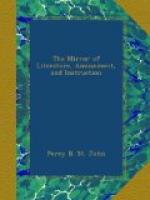[2] Gardeners’ Magazine, No. XXXIII. August, 1831.
As a means of social improvement, (a feature of public interest, we hope, always to be identified with The Mirror,) we need scarcely add our commendation of the design of the Botanic Garden at Manchester, and similar establishments in other large towns of Britain. What can be a more delightful relaxation to a Lancashire Mechanic than an hour or two in a Garden: what an escape from the pestiferous politics of the times. At Birmingham too, there is a Public Garden, similar to that at Manchester, where we hope the Artisan may enjoy a sight at least of nature’s gladdening beauties.
In the suburbs of our great metropolis, matters are not so well managed; though Mr. Loudon, we think, proposes to unite a Botanic with the Zoological Gardens. Folks in London must study botany on their window-sills. The wealthy do not encourage it. Their love of the country is confined to the forced luxuries of kitchen-gardens, conveyed to them in wicker-baskets; and a few hundred exotics hired from a florist, to furnish a mimic conservatory for an evening rout. They shun her gardens and fields; but, as Allan Cunningham pleasantly remarks in his Life of Bonington: “Her loveliness and varieties are not to be learned elsewhere than in her lap. He will know little of birds who studies them stuffed in the museum, and less of the rose and the lily who never saw anything but artificial nose-gays."[3]
[3] Family Library, No. XXVII.
* * * * *
TO A SNOWDROP.
A Translation.
(For the Mirror.)
First and fairest of flowery visiter—through the dark winter I have dreamed of thy paleness and thy purity—youngest sister of the lily—likelier, thou art to be loved for thine own sake. Can so delicate a thing spring from an Earthly bed? or art thou, indeed, fallen from the heavens as a Snowdrop? Thus I pluck thee from thy clayey abode, in which, like some of us mortals, thou wouldst find an early grave. I place thee in my bosom, (oh! that it were half so pure as thou), and there shalt thou die. Thou comest like a pure spirit, rising from thy earthly home unsullied and unknown. No longer a child of the dust, thou steppest forth almost too delicately attired at such a season as this. Ye winds of heaven: “breathe on it gently.” Ye showers descend on my Snowdrop with the tenderness of dew. Little flower, I love thy look of unpretending innocence: thou art the child of simplicity. Thou art a flower, even though colourless. Wert thou never gay as others? Where are the hues thou once didst wear? Hast thou lent them to the rainbow, or to gay and gaudy flowers, or why so pale? Dost thou fear the winter’s wind? Canst thou survive the snow-storm? Tell me: dost thou sleep by starlight, or revel with midnight fairies? My Snowdrop, I pity thee, for thou art




